What Company Cleans Hanger Clinic Everett Wa

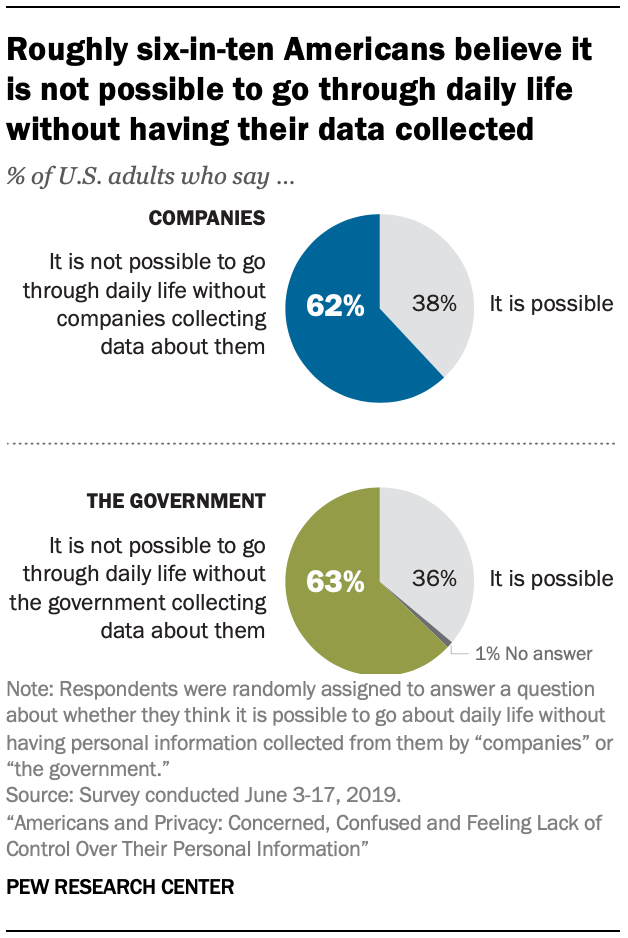 A majority of Americans believe their online and offline activities are being tracked and monitored by companies and the government with some regularity. It is such a common status of modern life that roughly vi-in-ten U.Due south. adults say they practise not think it is possible to get through daily life without having data collected most them past companies or the regime.
A majority of Americans believe their online and offline activities are being tracked and monitored by companies and the government with some regularity. It is such a common status of modern life that roughly vi-in-ten U.Due south. adults say they practise not think it is possible to get through daily life without having data collected most them past companies or the regime.
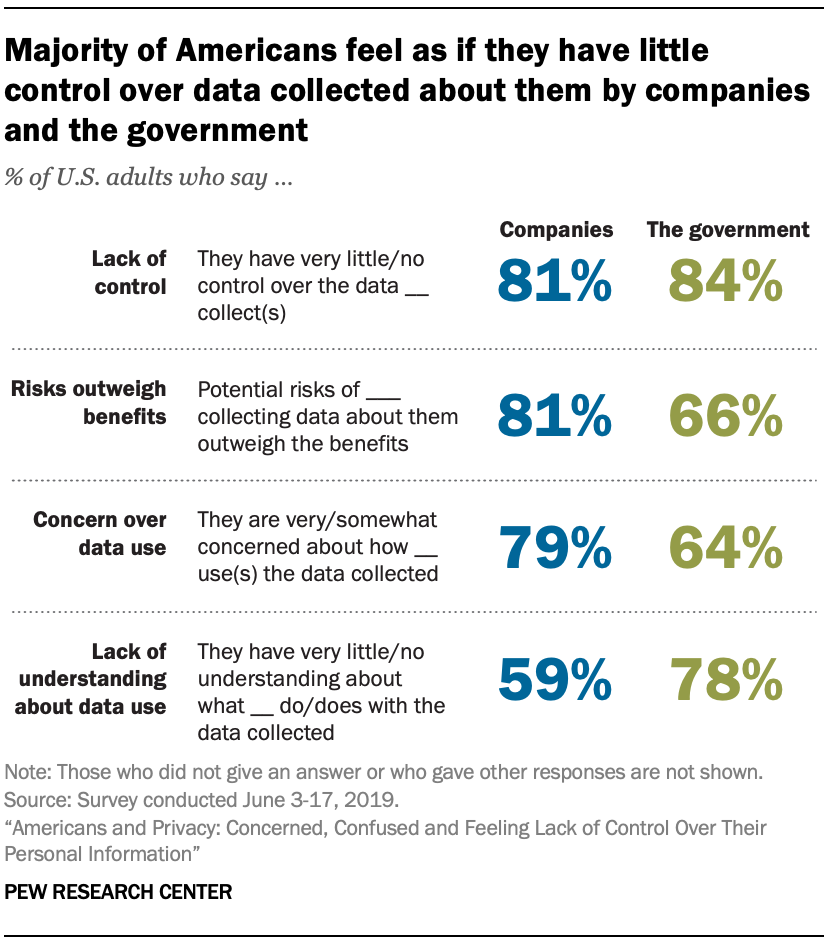 Information-driven products and services are often marketed with the potential to save users time and money or fifty-fifty lead to better health and well-being. Still, large shares of U.Southward. adults are non convinced they benefit from this organisation of widespread data gathering. Some 81% of the public say that the potential risks they face up because of information collection by companies outweigh the benefits, and 66% say the aforementioned about government data collection. At the same time, a bulk of Americans report being concerned about the way their data is existence used by companies (79%) or the regime (64%). Nearly likewise feel they have little or no control over how these entities apply their personal information, according to a new survey of U.S. adults by Pew Research Centre that explores how Americans experience nearly the state of privacy in the nation.
Information-driven products and services are often marketed with the potential to save users time and money or fifty-fifty lead to better health and well-being. Still, large shares of U.Southward. adults are non convinced they benefit from this organisation of widespread data gathering. Some 81% of the public say that the potential risks they face up because of information collection by companies outweigh the benefits, and 66% say the aforementioned about government data collection. At the same time, a bulk of Americans report being concerned about the way their data is existence used by companies (79%) or the regime (64%). Nearly likewise feel they have little or no control over how these entities apply their personal information, according to a new survey of U.S. adults by Pew Research Centre that explores how Americans experience nearly the state of privacy in the nation.
Americans' concerns well-nigh digital privacy extend to those who collect, store and use their personal information. Additionally, majorities of the public are not confident that corporations are skillful stewards of the data they collect. For example, 79% of Americans say they are not too or not at all confident that companies will acknowledge mistakes and have responsibility if they misuse or compromise personal information, and 69% written report having this aforementioned lack of confidence that firms will employ their personal information in ways they volition exist comfy with.
Several of the queries of this survey focus on public perceptions of what "the government" does related to personal data. For instance, respondents were asked: "As far equally you know, how much of what you do online or on your cellphone is being tracked by the authorities?" Related questions focused on people'south attitudes nigh the data the government collects about them.
It is hard to determine how much personal information the government collects and otherwise tin access through private company records. Administrative regime agencies like the IRS, Census Agency, Postal Service and social welfare departments assemble various personal details about people. That includes their tax- and employment-related information, concrete attributes if they go a regime ID, financial circumstances if they get benefits from social, housing and employment training programs, health information if they participate in authorities health-insurance programs, addresses, household composition, property buying if they ain houses or cars and educational details if they get student loan or grant, for example. This list is not exhaustive.
Beyond that, national security organizations similar the National Security Agency have authority to monitor phone traffic and people's movements. With subpoenas or court orders and warrants, law enforcement organizations can typically access and monitor people'southward phone and traffic records, health records (including genetic records), online and app browsing, search queries, texts and emails. Users' social media activities and their tech-based social networks are at least at times examined in investigations, according to "transparency reports" released by the companies.
Information technology is important to annotation, that at that place are often limitations on the ways regime agencies can share what they know with others, including those in other parts of the government.
There is also a collective sentiment that data security is more elusive today than in the past. When asked whether they think their personal data is less secure, more secure or virtually the same as it was v years ago, 70% of adults say their personal data is less secure. But 6% report that they believe their data is more secure today than information technology was in the past.
But even as the public expresses worry about various aspects of their digital privacy, many Americans acknowledge that they are not always diligent about paying attending to the privacy policies and terms of service they regularly meet. Fully 97% of Americans say they are e'er asked to corroborate privacy policies, yet only about 1-in-five adults overall say they always (9%) or often (thirteen%) read a visitor's privacy policy before agreeing to it. Some 38% of all adults maintain they sometimes read such policies, just 36% say they never read a company's privacy policy before like-minded to it.
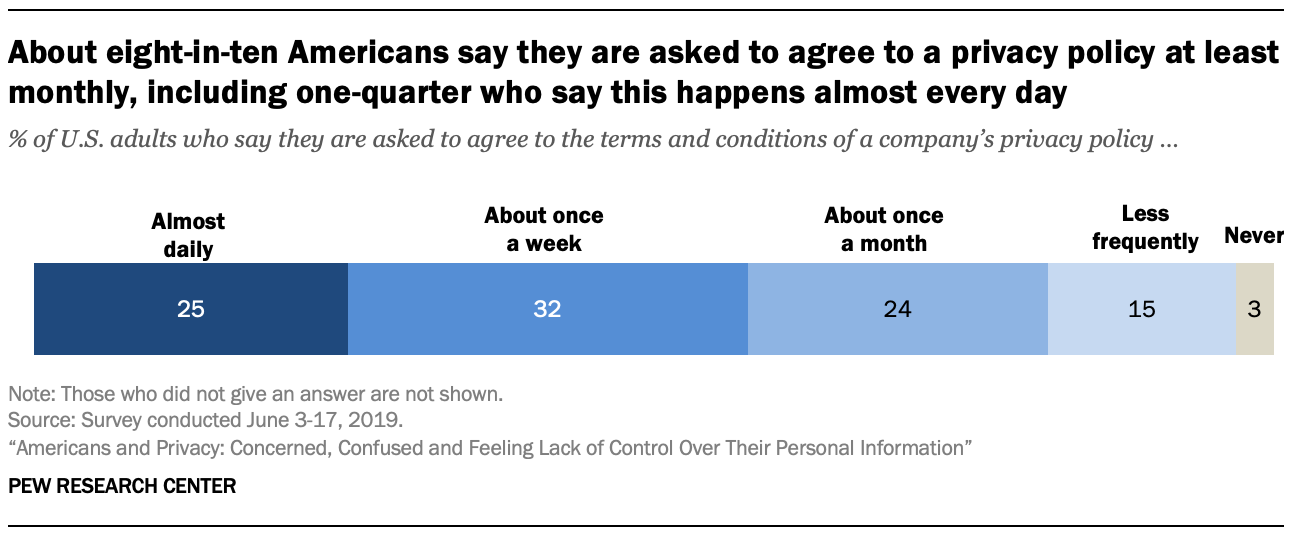 Moreover, the exercise of reading privacy policies doesn't necessarily guarantee thoroughness. Among adults who say they ever read privacy policies before agreeing to their terms and weather, merely a minority – 22% – say they read them all the mode through before agreeing to their terms and atmospheric condition.
Moreover, the exercise of reading privacy policies doesn't necessarily guarantee thoroughness. Among adults who say they ever read privacy policies before agreeing to their terms and weather, merely a minority – 22% – say they read them all the mode through before agreeing to their terms and atmospheric condition.
There is too a general lack of understanding about data privacy laws among the general public: 63% of Americans say they understand very little or nix at all most the laws and regulations that are currently in place to protect their information privacy.
These findings point to an overall wariness well-nigh the state of privacy these days, simply there are some circumstances where the public sees value in this blazon of data-driven environs. For case, pluralities of adults say it is acceptable for poorly performing schools to share data near their students with a nonprofit group seeking to help improve educational outcomes or for the government to collect data nearly all Americans to assess who might be a potential terrorist.
These findings come from a survey of 4,272 U.S. adults conducted on Pew Research Center's American Trends Panel between June iii-17, 2019.
Here are some of the key takeaways:
P revalence of tracking: 72% of Americans report feeling that all, almost all or virtually of what they exercise online or while using their cellphone is beingness tracked by advertisers, technology firms or other companies. Another nineteen% call back some of what they do is being tracked. Close to one-half (47%) of adults believe at least most of their online activities are being tracked by the regime.
When it comes to their offline behavior such every bit where they are or whom they talk with, 69% believe companies are tracking at least some of that activeness. And 56% of Americans retrieve the government is tracking at least some of their activities, like who they are talking to or their whereabouts.
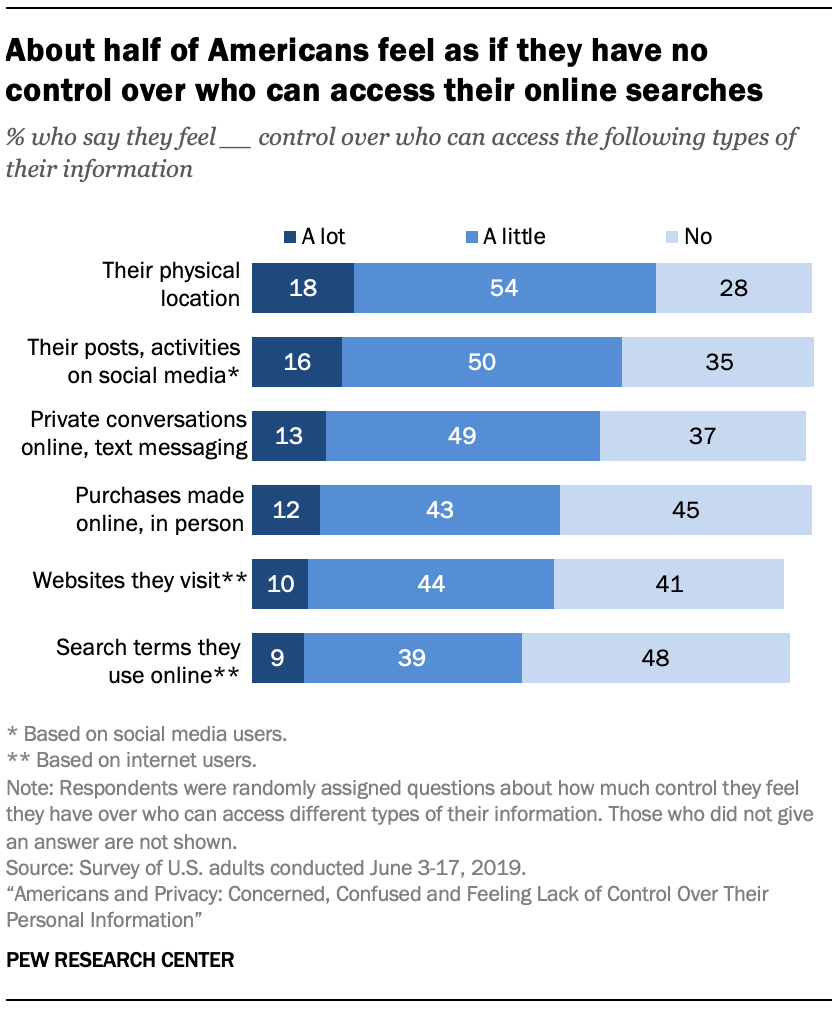 Non feeling in control of personal data: Roughly eight-in-ten or more U.Southward. adults say they have very lilliputian or no command over the data that regime (84%) or companies (81%) collect about them.
Non feeling in control of personal data: Roughly eight-in-ten or more U.Southward. adults say they have very lilliputian or no command over the data that regime (84%) or companies (81%) collect about them.
When it comes to different kinds of information, the movie varies by the specific blazon. While relatively few Americans feel as if they have a lot of command over who has access to everything from their physical location to their social media posts, there are experiences in which some Americans especially feel a lack of control. Roughly half of Americans (48%) say they feel as if they have no control over who can access the search terms they utilize, and 41% say the aforementioned well-nigh the websites they visit. Past comparing, a smaller share of the public feels as if they exercise non have control over who can access their physical location.
Risks vs. rewards of data collection and profiling: 81% of Americans retrieve the potential risks of data drove past companies well-nigh them outweigh the benefits, and 66% say the aforementioned most authorities information drove well-nigh them. Relatedly, 72% of adults say they personally benefit very picayune or none from visitor information collection about them, and 76% say this about the benefits they might get from authorities information collection.
One aim of the data collection done past companies is for the purpose of profiling customers and potentially targeting the sale of goods and services to them based on their traits and habits. This survey finds that 77% of Americans say they have heard or read at least a scrap about how companies and other organizations use personal data to offer targeted advertisements or special deals, or to appraise how risky people might exist equally customers. Almost 64% of all adults say they have seen ads or solicitations based on their personal data. And 61% of those who accept seen ads based on their personal data say the ads accurately reflect their interests and characteristics at to the lowest degree somewhat well. (That amounts to 39% of all adults.)
Data drove and sharing for specific purposes: Despite their broad concerns about data collection and use by companies and the authorities, pluralities of U.S. adults say it is adequate for data to be used in some ways. For case, by a 49%-27% margin, more Americans find information technology acceptable than unacceptable for poorly performing schools to share data almost their students with a nonprofit group seeking to help improve educational outcomes. Similarly, 49% say it is adequate for government to collect data about all Americans to assess who might be a potential terrorist threat. That compares with 31% who experience it is unacceptable to collect information from all Americans for that purpose.
On the other manus, more than find information technology unacceptable than acceptable for social media companies to monitor users' posts for signs of depression so they can identify people who are at risk of self-harm and connect them to counseling services (45% vs. 27%). The same pattern arises when it comes to companies that make smart speakers sharing sound recordings of customers with law enforcement to aid with criminal investigations: 49% say this information technology is unacceptable, while 25% find information technology acceptable.
The public is more than evenly divided when it comes to the acceptability of fitness tracking app makers sharing user data with medical researchers to better understand the link between exercise and middle disease.
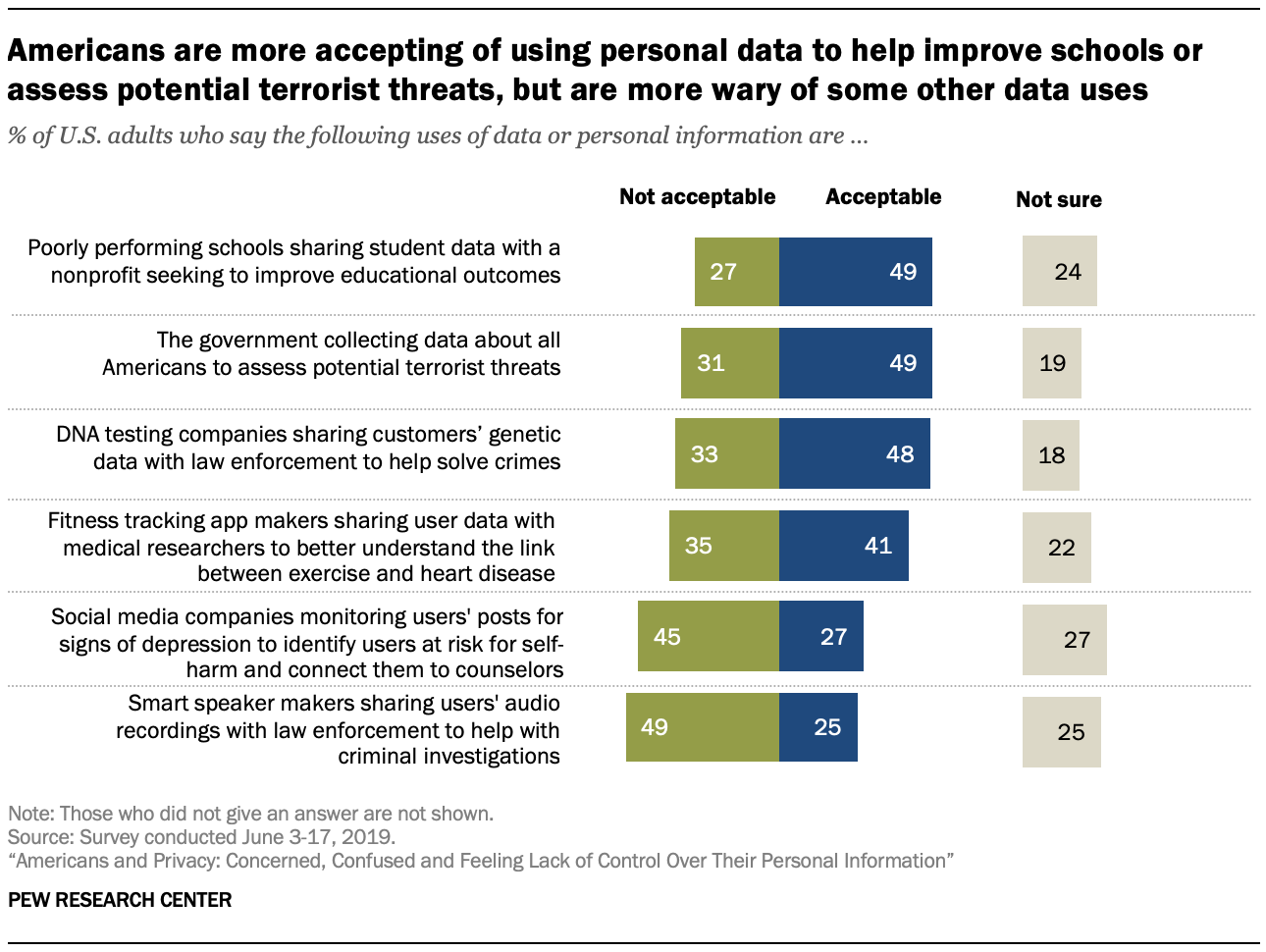
Concern nigh how data is used: 79% of adults assert they are very or somewhat concerned most how companies are using the data they collect most them, while 64% say they have the same level of concern virtually regime data collection.
Separately, Americans have mixed views about which groups concern them in getting access to their data: About four-in-ten are concerned a lot about the personal information social media sites (40%) or advertisers might know about them (39%). But only 9% of Americans worry a lot about the information family and friends might know and nineteen% have like concerns about what their employers might know.
Still, the majority of Americans are not confident well-nigh the style companies will behave when it comes to using and protecting their personal information. Roughly vii-in-ten or more say they are not too or not at all confident that companies will admit mistakes and take responsibility when they misuse or compromise information (79%), will be held answerable by government if they misuse data (75%), or will use customers' information in ways that people would feel comfy with (69%).
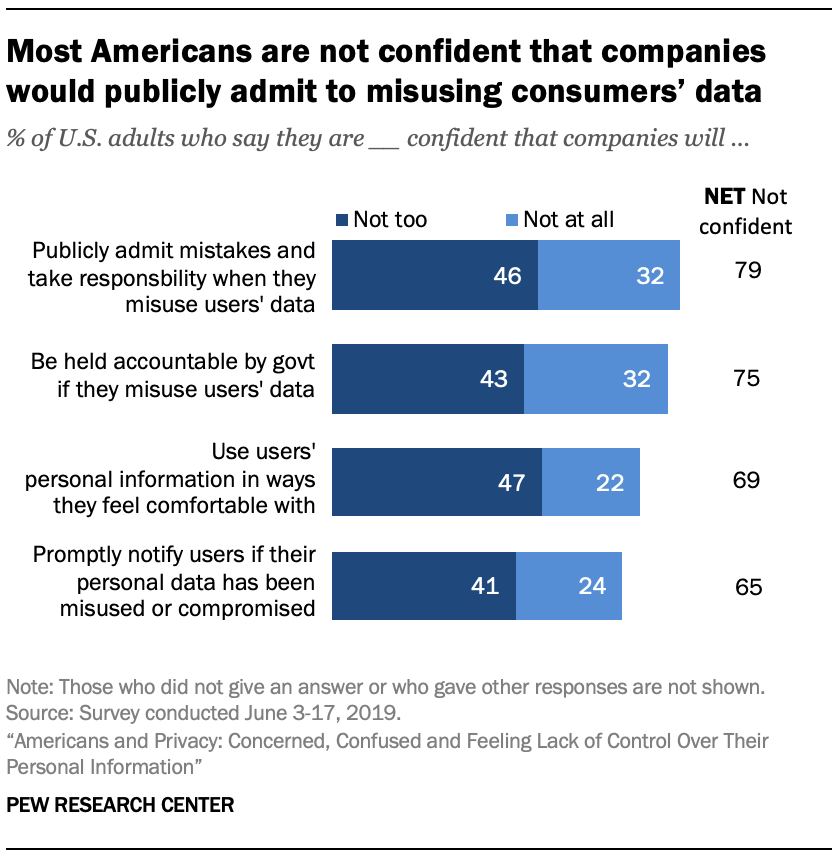
When it comes to data use for specific purposes, Americans have varying views depending on the purpose for the data employ. For instance, 57% of adults say they are very or somewhat comfortable with companies using their personal information to help companies better their fraud prevention systems. But they are evenly separate when the event is their comfort with companies using their personal information in developing new products. Most a third (36%) of adults say they are at least somewhat comfy with companies sharing their personal data with outside groups doing enquiry that might help them improve social club, simply a larger share (64%) say they would be uncomfortable with this exercise.
Lack of understanding: 78% of U.Due south. adults say they sympathize very little or nothing nigh what the government does with the data it collects, and 59% say the same about the data companies collect. Only 6% of adults say they understand a dandy deal what companies practice with the data nerveless, and a similar share (four%) say they know a great deal nigh what the government does with the data.
Some Americans besides admit they struggle to sympathise the privacy laws that govern use of their data. Roughly half dozen-in-ten Americans (63%) say they have very little or no understanding of the laws and regulations that are currently in identify to protect their privacy. Only 3% of adults say they understand these laws a great deal, and 33% say they have some agreement.
How Americans handle privacy policies: Core parts of the current system of data drove and privacy protection are built on the thought that consumers are given find nearly how firms collect and use information and ask for their consent to having their data used that way. Fully 97% say they are ever asked to approve privacy policies, still simply one-in-five adults overall say they ever (nine%) or frequently (13%) read these policies. Some 38% of U.South. adults maintain they sometimes read such policies, and 36% say they never read a company's privacy policy earlier agreeing to information technology. In all, about iv-in-ten adults say they understand privacy policies great deal (8%) or some (33%).
In addition to the concerns cited above about how companies handle personal information, a bulk of Americans (57%) say they are not too confident (xl%) or not at all confident (17%) companies follow what their privacy policies say they will do with users' personal information.
Several other fundamental findings in the survey:
- Roughly three-in-10 Americans (28%) say they have suffered at least i of iii kinds of major identity theft bug in the previous 12 months at the time of the survey: 21% have had someone put fraudulent charges on their credit or debit carte du jour; 8% have had someone have over their social media or electronic mail accounts without their permission; and 6% have had someone effort to open a credit line or get a loan using their name.
- A bulk of U.S. adults (57%) say they follow privacy news very closely (eleven%) or somewhat closely (46%).
There are some differences by historic period on some privacy bug: People in dissimilar age groups take varying views on some primal privacy and surveillance issues. Americans ages 65 and older are less likely than those ages eighteen to 29 to feel they have control over who can admission things similar their physical location, purchases fabricated both online and offline and their individual conversations. At the same time, older Americans are less likely to call up they benefit from data collection: Only 17% of those 65 and older assertive they benefit from the data authorities collects about them, and only 19% retrieve the same nearly data collected past companies.
At that place are too age differences on the issue of how data gets used once obtained. Americans ages 65 and older are more likely than younger adults to say it is acceptable for police enforcement to use customers' genetic information to assistance solve crimes, approve information collection to assess terrorist threats, and have smart speaker makers share users' sound recordings in investigations. By dissimilarity, young adults ages 18 to 29 are more likely than older adults to detect acceptable the thought that social media companies monitor users for signs of depression and to let fitness tracking user information to exist shared with medical researchers.
In addition, two-thirds of adults ages 65 and older say they follow privacy news at to the lowest degree somewhat closely, compared with just 45% of those eighteen to 29 who exercise the same.
There are differences by race and ethnicity on some privacy problems: Black Americans are more likely than white Americans to say they believe the authorities is tracking all or nigh of what they do online or on their cellphone (60% vs. 43%). Similar gaps are present in views about offline activities: 47% of black adults retrieve all or most of their offline activities are tracked by the government, compared with simply 19% of white adults.
In addition, blackness and Hispanic adults are more likely than white adults to say they are concerned to some degree about what law enforcement officials, employers and family unit and friends know about them.
When it comes to identity-theft issues, black adults (twenty%) are roughly 3 times every bit probable as their Hispanic (vii%) or white counterparts (6%) to say someone has taken over their social media or email account in the past yr. Black Americans are also more than likely than white and Hispanic adults to say someone attempted to open a line of credit or applied for a loan using their name in the past 12 months.
At the same fourth dimension, white adults also study feeling less command across several information types when compared with black and Hispanic adults. For example, 50% of white Americans experience they accept control over who can access information about their on- and offline purchases, compared with 69% of black adults and 66% of Hispanic adults.
CORRECTION: In the chart, "Bulk of Americans feel every bit if they have piffling command over data collected about them by companies and the government," the explanatory text for the findings related to "Risks outweigh benefits" was transcribed incorrectly. The correct text is, "Potential risks of ___ (companies or the authorities) collecting information nearly them outweigh the benefits."
Source: https://www.pewresearch.org/internet/2019/11/15/americans-and-privacy-concerned-confused-and-feeling-lack-of-control-over-their-personal-information/
Posted by: johnsonolcou1989.blogspot.com


0 Response to "What Company Cleans Hanger Clinic Everett Wa"
Post a Comment